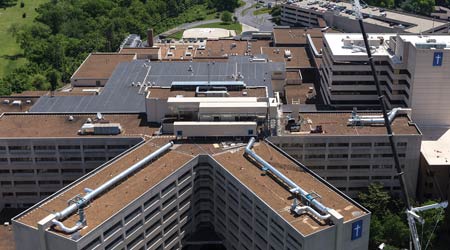« Back to Facilities Management News Home
« Green
Diesel Technology Forum: California Zero Emissions Demonstration Project Includes Diesel Plug-In Hybrid Trucks
Washington, D.C. — May 20, 2016 — New diesel technology will be part of a $23.6 million zero-emission transportation test program in California for emerging commercial vehicle technologies designed to reduce greenhouse gases, smog, and petroleum use in ports and rail yards along busy freight corridors.
The California Air Resources Board awarded the $23.6 million to the South Coast Air Quality Management District to fund four vehicle and engine manufacturers testing emerging zero-emissions technology deployed on 43 harbor trucks. The participating Volvo Group project, under its Mack Trucks brand, will couple a clean diesel engine with plug-in electric and hybrid capabilities.
“The fact that an advanced diesel engine was selected for this zero emissions demonstration project highlights the proven benefits of clean diesel technology and in helping California achieve its clean air and climate goals,” said Allen Schaeffer, executive director, Diesel Technology Forum. “One of the important benefits of the diesel platform is its capability for continuous improvement. From advanced engine designs, hybridization, and even low-carbon liquid biofuels, clean diesel technology continues to evolve to provide substantial clean air benefits.”
Schaeffer said clean diesel commercial vehicles in service across California are already contributing to air quality improvements, greenhouse gas reductions, and substantial fuel savings. A single clean diesel Class 8 tractor powered by an engine that meets the Model Year 2010 emissions standards saves roughly 9 tons of carbon dioxide emissions, eliminates 1 ton of smog-forming emissions of oxides of nitrogen (NOx), and saves 21 barrels of crude oil, according to research by the Martec Group.
Overall, from 2010 to 2015, the fleet of 160,000 clean diesel commercial vehicles in California has eliminated 700,000 tons of NOx, 2.5 million tons of carbon dioxide, and saved 5.8 million barrels of crude oil, Schaeffer said.
Schaeffer said these immediate environmental benefits for California could be even higher with the increased use of clean diesel vehicles.
“While the latest clean diesel technologies demonstrate enormous benefits, California comes in almost dead last of all 50 states for adoption of the latest near-zero emissions technologies,” Schaeffer said. “Only 18 percent of California’s commercial vehicle fleet are equipped with a clean diesel engine that meets the most recent emissions standard established by the U.S. Environmental Protection Agency. This is lower than the national average of 26 percent.
“Enormous clean air, climate and fuel savings would be immediately available to California if it reached the national level of clean diesel technology adoption,” Schaeffer said. “This would immediately result in the elimination of an additional 35,000 tons of NOx emissions. Indiana has the highest percentage of clean diesel trucks with 46 percent, and if California were to match this level, an additional 95,000 tons of NOx could be immediately eliminated.
“While demonstration projects are important to achieve incremental progress towards cleaner air, greater adoption of the latest technologies already available will provide immediate term benefits to those communities most in need, like high traffic areas,” Schaeffer said. “It’s important that California give consideration to the increased adoption of proven clean technologies that are available right now and can provide immediate air quality improvements.”
The Diesel Technology Forum is a non-profit national organization dedicated to raising awareness about the importance of diesel engines, fuel, and technology. Forum members are leaders in clean diesel technology and represent the three key elements of the modern clean-diesel system: advanced engines, vehicles and equipment; cleaner diesel fuel; and emissions-control systems. For more information, visit www.dieselforum.org.
More From 5/26/2016 on FacilitiesNet








